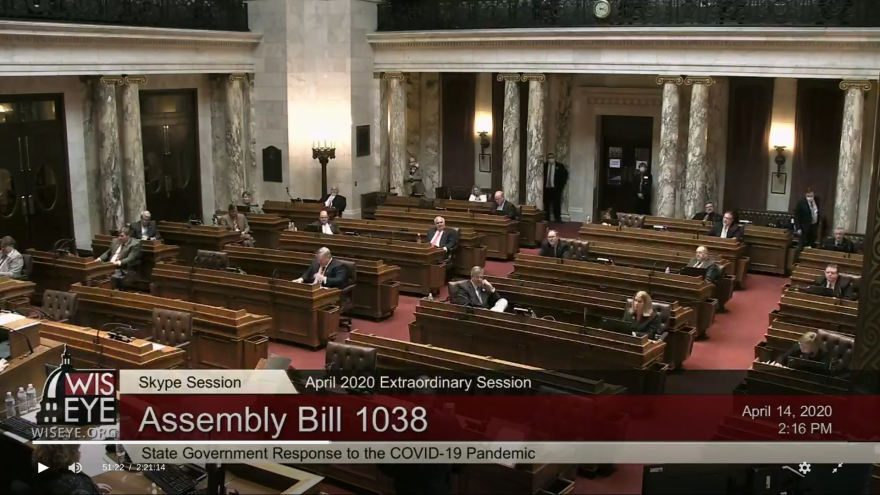Updated at 1:10 p.m. CT
The Wisconsin Senate passed a legislative response to the coronavirus pandemic on Wednesday. The state Assembly easily passed the package Tuesday, which includes more than 50 provisions related to health care and the economy. But as is typical in the Wisconsin Legislature, there are some controversial items.
The battles began a couple weeks ago with Gov. Tony Evers over the content of the proposal. But Assembly Speaker Robin Vos says Republicans and Democrats now need to come together because more than 150 people in Wisconsin have died from COVID-19.
>>The Latest WUWM & NPR Coronavirus Coverage
>>WUWM Coronavirus Blog: Week of April 13
Vos, a Republican who helped keep the spring election on April 7, said he knows two of the five citizens who have passed away in Racine County. “One gentleman’s name was John Knuteson. He was former chair of the Racine County Republican Party. A very well-known attorney, he had a loving family and was a dedicated community activist. Another one that I knew personally was from my own hometown of Burlington. She was one of my mother-in-law’s best friends," he said, while standing in the State Assembly Chambers at the State Capitol in Madison.
The state, Vos said, is dealing with a huge economic crunch. “Since March 12, there have been more than 385,000 people who have filed an initial unemployment claim. Compare that to the same period last year, when there was only 27,000," he said.
The legislative package suspends the state’s one-week waiting period for unemployment benefits until next February and allows Wisconsin to receive hundreds of millions in federal dollars to help the state pay Medicaid expenses. The Legislature’s GOP-controlled finance committee could eventually hand out as much as $75 million to meet additional state needs related to COVID-19, that’s beyond the $2 billion state government is getting from the recently-passed federal CARES Act.
>>What's Inside The Senate's $2 Trillion Coronavirus Aid Package
The package also allows local governments to defer property tax payments for struggling homeowners and businesses, testing for the coronavirus would not have any insurance co-pays, and discrimination would be illegal against people who have suffered from the virus when they apply for a job or health insurance.
There are dozens of other provisions, including some that the GOP added in the last day or two. Minority Leader Gordon Hintz (D-Oshkosh) urged his members to vote for the bill.
Rep. Hintz, also in the Assembly Chambers, warned that lawmakers may have to come back into session later this spring when state executive orders expire for the current public health emergency. “I know y’all think that 60 days is going to end and everything’s going to open up again, or it will be back to freedom. But, I’m not sure we’re going to want that, or be ready for that, or it’s the best thing for our state or our economy,” he said.
Hintz said there will have to be more help for the University of Wisconsin System, which has lost a lot of revenue. He also wanted lawmakers to take up the issue of voting by mail this fall.

Only two legislators voted against the COVID-19 bill, Milwaukee Democrats Jonathan Brostoff and Marisabel Cabrera. In a joint statement, the representatives said they wanted more help for frontline workers in health care and other jobs. They blasted a late plan to reduce training for certified nursing assistants.
Due to COVID-19 concerns, more than half of the 99 Assembly members took part in Tuesday’s Extraordinary Session via computer from locations like their home or an office. Some members seemed unfamiliar with the technology, so roll call votes took about ten minutes apiece.
Just before a brief break in the discussion, Rep. Tyler August, Speaker Pro Tempore, issued a warning: “Members who are participating virtually, do not close out of your system. Do not close your laptop. Don’t touch anything!”
Editor's note: Audio of the lawmakers is courtesy of the WisconsinEye.



